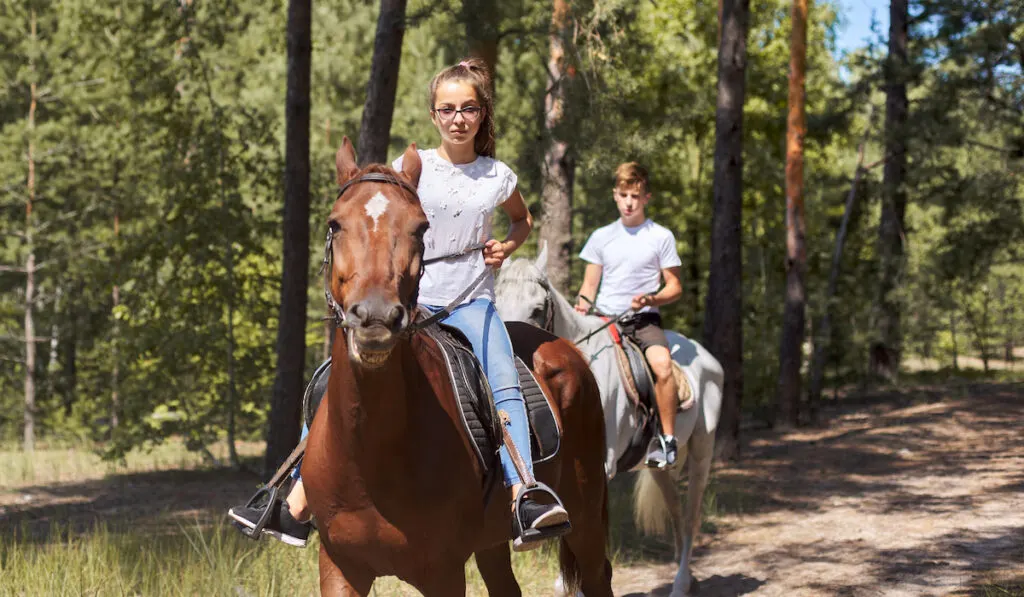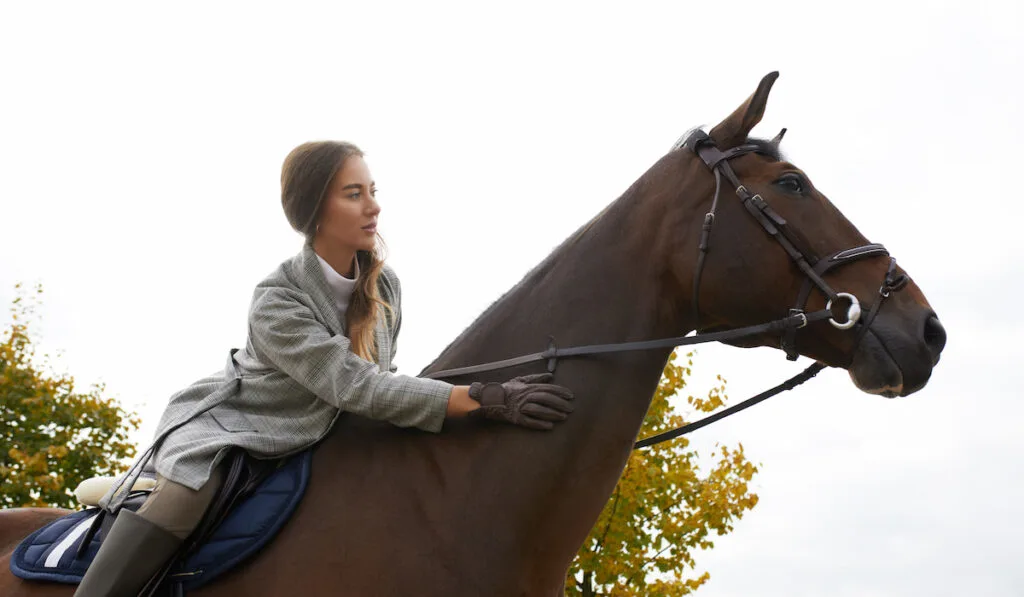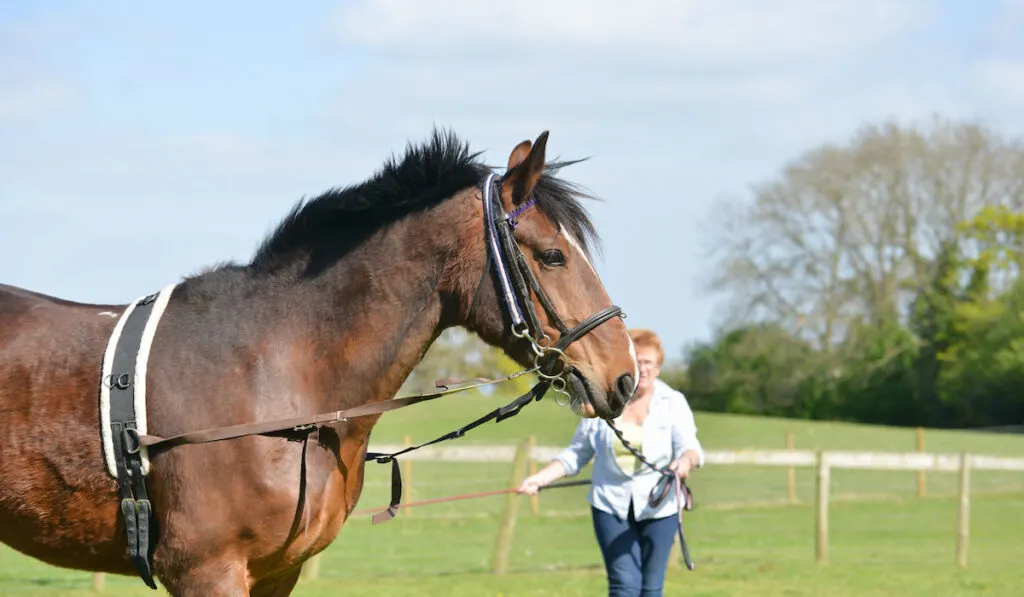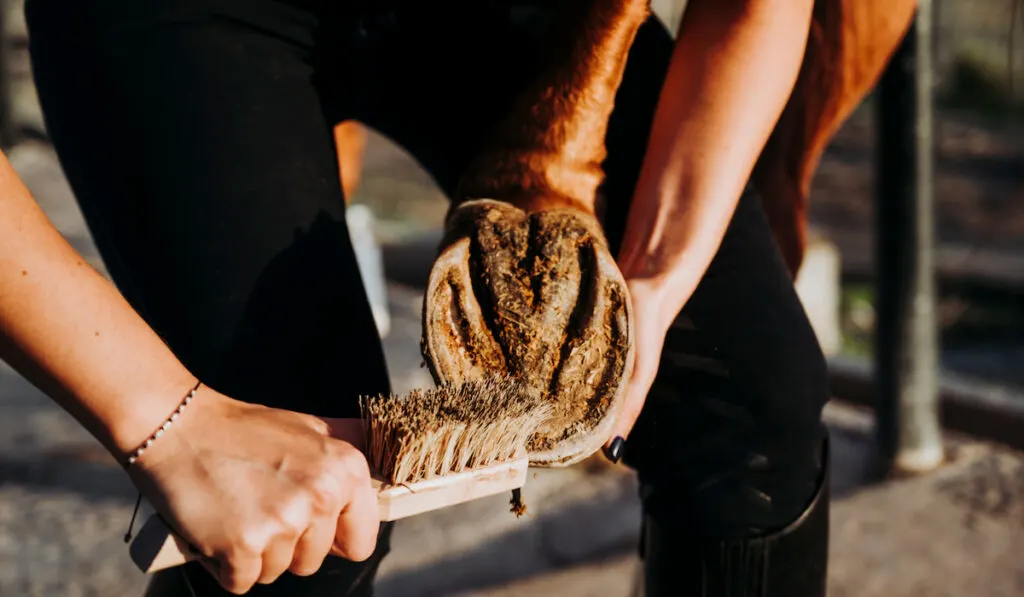If you ride horses or are involved in the horse world, you will inevitably face the question of whether it is cruel to ride horses. It can make you or others really start to question the ethical value of horse riding, but the answer is not as clear cut as many believe.
It is not cruel to ride horses if it is done correctly. Understanding how riding affects horses and learning the right way to ride are the keys to keeping your horseback riding cruelty-free. Inexperienced riders and lack of medical care can potentially make riding cruel to the involved horses.

Horse riding is a way of life for many equestrians and many horses seem to enjoy it, regardless of what naysayers may declare.
The truth is, if a horse really did not want a rider on its back, it could throw him or her off with ease.
With the right education, experience, and care, riders can help keep horseback riding safe and enjoyable for themselves and their horses.
Table of Contents
Do Horses Feel Pain When Ridden?
Horses can sometimes feel pain when they are being ridden, it is inevitable. It may or may not be due to the sport of riding itself.
Horses that are suffering from back or leg problems may experience some pain when being ridden. As horses age, they will also suffer from arthritis in the same way humans do.
Young or small-sized horses can also experience pain from riders who are too heavy for them.
Most riders say that a horse should carry a rider no more than 20% of their weight. So, if a horse weighs 1200 pounds, a rider should be 240 pounds or less to avoid discomfort.
Horses that are experiencing pain will show signs of their discomfort such as limping, bucking, and agitation.
Do Horses Like Being Ridden?
Not every horse necessarily likes to be ridden, but many equestrians would argue that some horses do like being ridden.
While there is no way to know for sure, if a horse does not like to be ridden by a human, they will most likely let you know.
Horses that clearly do not like to be ridden can effortlessly throw their riders off by bucking, rearing up or by simply cutting out from underneath them.
A horse can easily weigh more than 1000 pounds, so an average-sized human is really no match if the horse decides it doesn’t want to be ridden.
Does It Hurt Horses When You Ride Them?
If riders follow all the right precautions, it should not hurt horses when you ride them. Horses must be saddled correctly with ride gear to make sure they do not suffer injuries, rashes or, sores.
Work with an experienced rider to learn the proper way to saddle and prepare a horse for riding.

Occasionally, unavoidable accidents can happen, and horses can experience muscle strains or sprains when being ridden.
Always walk your horse for a bit when you first start a ride. You should transition into more extraneous riding slowly so that you help them loosen up their muscles, preventing injury.
Is Horse Riding Ethical?
Ethics deals with the moral reasoning that persuades us to act a certain way.
Regarding horses, riding is ethical if the rider takes into consideration the feelings, health, and wellbeing of their horse.
A good rider should want to do what is best for their horse. This can mean improving their own riding abilities, working with a trainer, getting their horse appropriate medical and orthopedic care, as well as not riding or forcing a horse to ride if it is clear they do not want to or are not able to be ridden.
Negative Effects of Horse Riding
If the rider is inexperienced, horse riding can lead to physical and emotional issues in a particular horse.
Overexertion, muscle strains and sprains, ligament tears, and lameness can all occur in horses that are ridden regularly by impatient or untrained riders.
Horses that are handled by an inexperienced rider can develop trust issues, anxiety, and fear as well.
Horse riders should always educate themselves on the right way to ride, handle, and care for horses before ever riding one.
Positive Effects of Horse Riding
Horseback riding does have a lot of positive effects on horses. Riding can help horses develop strong bonds with their owners.
Horse riding can also help horses develop their muscles and work on their agility. It can allow high energy horses to release some of their built-up energy so that they can enjoy their lives more thoroughly.
Many horses thoroughly seem to enjoy participating in riding sports including barrel racing, pole bending, sorting, team penning, and roping.
Riding gives many horses a more well-rounded life than just hanging out in a stall or pasture.
Ways to Keep Your Riding Horse Healthy
1. Help your horse loosen its muscles before riding to avoid muscle injuries.

Use a lunge line or walker before riding or walk your horse slowly when you first get on.
Your horse needs to loosen up its muscles the same way a runner does before running. Allow a horse to walk a while or for a couple laps until it warms up its muscles.
2. Pay attention to uneven walking or repeated tripping.
A change in your horse’s gait can indicate if it is experiencing pain while being ridden.
You should stop riding as soon as you notice an issue and investigate the problem before continuing. Sometimes it can be as simple as something caught in their hoof or it could be something more serious.
3. Have a farrier trim their hooves regularly.
All horses should have their hooves maintained regularly by a professional farrier.
Hoof issues can lead to serious leg problems for horses if they are not taken care of quickly. Regular hoof care can prevent many issues before they become serious.
4. Clean and check their hooves often in between farrier visits.

Horse’s hooves should be cleaned and checked often by their owners.
Removing dirt and debris can keep your horse’s hooves dry and healthy. It will also help you spot hoof issues before they become a bigger problem.
5. Consider using an equine chiropractor.
Experienced equine chiropractors can help treat your horse’s joint, back, or leg pain by manipulating a horse’s muscular and skeletal systems.
They can evaluate your horse’s issues and determine whether equine chiropractic manipulation can help or if a veterinarian needs to treat the horse.
All equine chiropractic services should be done in conjunction with a veterinarian to keep your horse safe and healthy. (source)
6. Treat Medical Issues Quickly
If an injury is severe, seek a veterinarian’s advice as soon as possible.
If a horse is walking strangely or limping, let them rest and if they do not improve soon, get them to a veterinarian before it gets worse.
Equestrians should never ride horses that are suffering from an injury or gait issue.
7. Work with a Trainer if You are Inexperienced.
New and inexperienced riders should work with a trainer or experienced rider when they first start riding horses.
This ensures that they learn the correct and safest way to ride their horse.
Learning basic things like pad and saddle placement can help keep your horse safe and free of pain during rides.
Final Thoughts
Riding horses may be considered cruel by some, but for many experienced equestrians, horseback riding is a positive experience for both them and their horses.
If riders really know what they are doing and put their horse’s needs first, then riding horses is not cruel.
True equestrians listen to their horses, care for them like they would their own children, and do whatever is needed to keep their horse-riding pain and cruelty-free.

